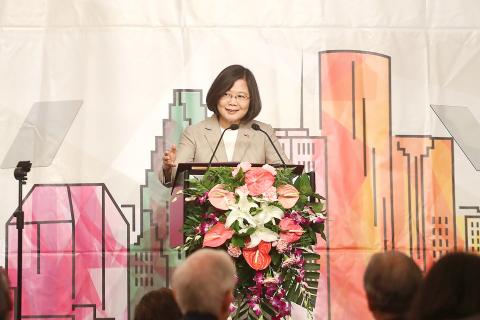President Tsai Ing-wen (蔡英文) on Saturday told Taiwanese expatriates in the US that she is leading Taiwan through a comprehensive transformation and hoped that all Taiwanese expatriates could join the effort.
“Taiwan is undergoing change, in a good direction,” Tsai said at a welcoming dinner in Houston, Texas, hosted by Taiwanese expatriates, after arriving for a 27-hour transit stop on the return leg of her visit to Taiwan’s diplomatic allies Paraguay and Belize.
“I’m at the helm of the country, I’m determined and confident that I will lead Taiwan, with my team, through a thorough transformation,” Tsai said.

Photo: CNA
She asked the audience to trust her and her administration and join the transformation effort.
Turning to Taiwan-US relations, Tsai hailed the US’ passage of the Taiwan Travel Act this year and its decision to continue arms sales to Taiwan as indications of a deepening mutually beneficial partnership between the two countries.
Taiwan and the US have also been collaborating on efforts to promote public health and gender equality, and to crack down on cross-border crimes, Tsai told the more than 1,000 guests at the dinner.
“Taiwan-US ties are the ray of light we expect” amid a growing threat to freedom of speech and to the lives of Taiwanese citizens, Tsai said, apparently referring to China’s increasing efforts to suppress Taiwan.
“Thank you for keeping the light on,” Tsai said, addressing US representatives Eddie Bernice Johnson and Al Green, who also attended the dinner.
It was Tsai’s second transit stop in Houston since taking office. The first was in January last year, when she made an official visit to four of Taiwan’s Latin American diplomatic allies.
Tsai departed Taiwan on Aug. 12 and had an overnight stopover in Los Angeles en route to Paraguay. She was to return to Taiwan last night.

Taiwanese were praised for their composure after a video filmed by Taiwanese tourists capturing the moment a magnitude 7.5 earthquake struck Japan’s Aomori Prefecture went viral on social media. The video shows a hotel room shaking violently amid Monday’s quake, with objects falling to the ground. Two Taiwanese began filming with their mobile phones, while two others held the sides of a TV to prevent it from falling. When the shaking stopped, the pair calmly took down the TV and laid it flat on a tatami mat, the video shows. The video also captured the group talking about the safety of their companions bathing

US climber Alex Honnold is to attempt to scale Taipei 101 without a rope and harness in a live Netflix special on Jan. 24, the streaming platform announced on Wednesday. Accounting for the time difference, the two-hour broadcast of Honnold’s climb, called Skyscraper Live, is to air on Jan. 23 in the US, Netflix said in a statement. Honnold, 40, was the first person ever to free solo climb the 900m El Capitan rock formation in Yosemite National Park — a feat that was recorded and later made into the 2018 documentary film Free Solo. Netflix previewed Skyscraper Live in October, after videos

Starting on Jan. 1, YouBike riders must have insurance to use the service, and a six-month trial of NT$5 coupons under certain conditions would be implemented to balance bike shortages, a joint statement from transportation departments across Taipei, New Taipei City and Taoyuan announced yesterday. The rental bike system operator said that coupons would be offered to riders to rent bikes from full stations, for riders who take out an electric-assisted bike from a full station, and for riders who return a bike to an empty station. All riders with YouBike accounts are automatically eligible for the program, and each membership account

A classified Pentagon-produced, multiyear assessment — the Overmatch brief — highlighted unreported Chinese capabilities to destroy US military assets and identified US supply chain choke points, painting a disturbing picture of waning US military might, a New York Times editorial published on Monday said. US Secretary of Defense Pete Hegseth’s comments in November last year that “we lose every time” in Pentagon-conducted war games pitting the US against China further highlighted the uncertainty about the US’ capability to intervene in the event of a Chinese invasion of Taiwan. “It shows the Pentagon’s overreliance on expensive, vulnerable weapons as adversaries field cheap, technologically